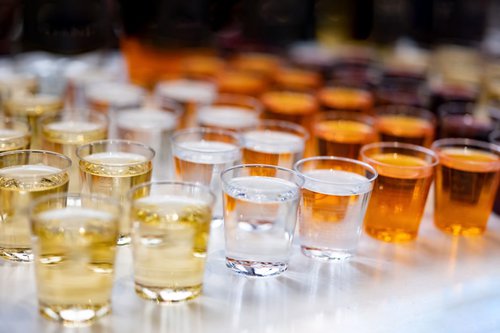What is “Bolus Drinking,” and how is it Related to Drinking and Driving in Canada?

You’ve undoubtedly heard of “binge,” “social,” and “problem” drinking, but have you ever heard of “bolus drinking” and its connection to driving under the influence (DUI) defence strategies?
If not, the criminal defence lawyers of TorontoDUI are here to educate you. “In mounting a bolus drinking defence, a driver admits that their BAC (blood alcohol concentration) was at or over the 80 mg legal threshold for a DUI conviction,” says TorontoDUI defence lawyer Robbie Tsang . “However, they argue that they weren’t over the legal threshold while driving because they had drunk a significant amount of alcohol right before getting behind the wheel. Because it takes time for the blood to be absorbed into the bloodstream, the breathalyzer machine provided a BAC reading above alcohol concentrations in the blood while driving.”
TorontoDUI criminal defence lawyer Jeff Mass adds, “It might seem farfetched, but this defence proved successful enough in the courts, that Canadian legislators revised DUI laws to make it harder to present a bolus defence.” Continuing, he says, “When used, the defence could raise ‘reasonable doubt’ that the alleged DUI offender was truly above the legal BAC threshold needed for a conviction. In acquitting a DUI defendant who used the bolus defence, an Ontario Court judge noted that he did not think the offender drank a significant amount of alcohol right before or after driving but was ‘not convinced beyond a reasonable doubt that she did not.’”
Canadian courts have wrestled with the bolus defence for decades, but 2018 revisions to the Criminal Code have made it much harder for defendants to raise it. Let’s take a before-and-after-legislative-changes look at this DUI defence
Why “Bolus” and What is Bolus Drinking?
In medicine, “bolus” is a term used to describe a single, large dose of a medication or other substance administered all at once. Researchers who study alcohol consumption adopted the “bolus drinking” term to describe the ingestion of a large volume of alcohol in a short period. To distinguish it from “binge drinking,” researchers emphasize its use in scientific contexts to assess its pharmacological effects.
It's unclear exactly when an enterprising Canadian defence lawyer first used bolus drinking as a successful defence, but its usage likely emerged organically to challenge the Crown’s breathalyzer evidence. The most notable early success we know in case law is R. v. Gibson (1992) 100 Sask.R. 88 (CA) . The defence presented expert witness testimony to convince an appeals court that the driver’s BAC would have been below the legal impairment threshold one hour before the breathalyzer testing was administered. In its ruling, the Saskatchewan Court of Appeal deemed that the trial judge failed to accept the bolus drinking defence based on alcohol absorption rates as “evidence to the contrary,” which could raise reasonable doubt.
Higher Courts Put Limitations on the Bolus Defence
Other higher-court rulings over the decades have put limitations on the bolus drinking defence in Canada. In R. v. Gibson [2008] 1 SCR 397 , a divided Supreme Court of Canada ruled that a defendant must offer robust evidence to displace a statutory presumption that breathalyzer testing reflects BAC levels while driving, provided the testing is done within two hours. Four years later, the high court ruled in R. v. St-Onge Lamoureux 2012 SCC 57 that such limitations on raising a bolus defence in DUI cases did not violate Charter Rights.
In 2010, the Ontario Court of Appeal ruled in R. v. Paszchenko 2010 ONCA 615 that courts can make a “common sense” inference that bolus drinking isn’t a viable defence because most people don’t drink large amounts of alcohol right before or while driving. To be accepted as evidence, the appeal court ruled, it must have an “air of reality.” A 2018 Ontario Court of Appeal ruling — R. v. Roberts, 2018 ONCA 411 — determined that a trial judge did not err by failing to instruct the jury on how to interpret an expert witness’s bolus drinking defence testimony. While the defence had asked the judge to direct the jury that bolus evidence is viable for raising a reasonable doubt about BAC levels, the court ruled that the jury should be allowed to come to this decision on its own accord.
Despite these limitations, some defendants successfully wielded the bolus defence before Canadian legislators revised DUI laws. In particular, courts have ruled that empty beer cans and half-empty liquor bottles raise the air of reality that the accused may have been engaged in bolus drinking.
Canadian Legislators Codify Bolus Drinking Defence Limitations
While the bolus drinking defence can expose a legitimate difference between BAC levels that may occur during the delay between driving and BAC testing, the Crown and advocates against impaired driving have long seen the defence as a loophole in Canada’s impaired driving laws. Thus, in 2018 Canadian legislators passed Bill C-46 , which, among other things, severely limits the viability of the bolus drinking defence.
Before the new legislation was enacted, the Criminal Code required the Crown to prove a driver’s BAC while they were driving. Because police can administer a breathalyzer test up to two hours after police stop a driver, this allowed the defence to raise the bolus drinking defence or otherwise challenge potential discrepancies between BAC levels and actual impairment. Section 320.14 of the Criminal Code now clarifies that having a BAC level at or exceeding 80 mg per 100 ml of blood constitutes a criminal DUI offence within two hours after “ceasing to operate a [motor vehicle].”
Thus, alcohol absorption rates are no longer an issue in DUI cases within this two-hour period. To the best of our knowledge, the new law has not yet faced any successful Charter Rights challenges relating to the presumption of innocence. The amended Code purposefully strived to avoid Charter Rights challenges by protecting those who may be innocent of driving while impaired but may have a high BAC level due to post-driving consumption. If you can prove that:
- You consumed alcohol after ceasing to drive;
- And that after ceasing vehicle operation, you had no “reasonable expectation” that you might be required to submit to BAC testing;
- And you can prove that after-driving alcohol consumption is consistent with BAC levels taken being lower than what they would have been when actually driving.
The bottom line in all this is that the bolus drinking defence remains in play, but successfully introducing it in court is now exceptionally challenging.
Arrested for DU in the GTA? — Consult with TorontoDUI
If police charge you with DUI in the Greater Toronto Area, secure the services of a skilled criminal defence DUI lawyer like those at TorontoDUI. While we likely won’t entertain mounting a bolus drinking defence, we have numerous other strategies that may be able to deliver you a positive outcome. With an outstanding 15-plus-year record of defending thousands of Toronto-area clients arrested for DUI, contact TorontoDUI for a free consultation.
